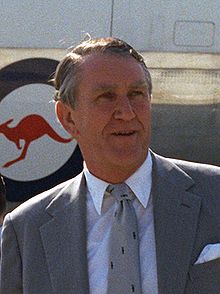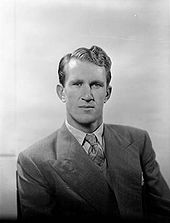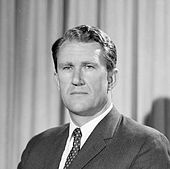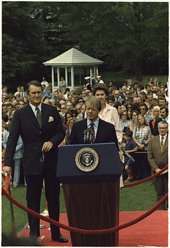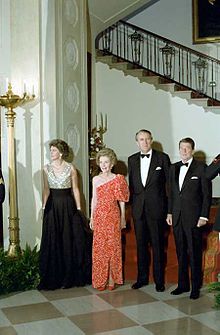- Malcolm Fraser
-
The Right Honourable
Malcolm Fraser
AC, CH, GCL, PCFraser in 1982 22nd Prime Minister of Australia
Elections: 1975, 1977, 1980, 1983In office
11 November 1975 – 11 March 1983Monarch Elizabeth II Governor General John Kerr
Zelman Cowen
Ninian StephenDeputy Doug Anthony (1975–83) Preceded by Gough Whitlam Succeeded by Bob Hawke Constituency Wannon (Victoria) Personal details Born 21 May 1930
Melbourne, VictoriaPolitical party Liberal Party of Australia Spouse(s) Tamie Fraser Alma mater Magdalen College, Oxford Religion Presbyterian John Malcolm Fraser AC, CH, GCL, PC (pronounced /ˈfreɪzə/; born 21 May 1930) is a former Australian Liberal Party politician who was the 22nd Prime Minister of Australia.[1] He came to power in the 1975 election following the dismissal of the Whitlam Labor government, in which he played a key role. After three election victories, he was defeated by Bob Hawke in the 1983 election and ended his career alienated from his own party.
Contents
Early life
Malcolm Fraser was born in Toorak to a family with a history of involvement in politics and the pastoral/grazing industry. His grandfather, Simon Fraser, emigrated from Nova Scotia in 1853, becoming a successful pastoralist and speculator, as well as a member of the Victorian Parliament, the Federation Conventions of 1897–98 and the Australian Senate.[2] Malcolm Fraser's father, John Neville Fraser, was a pastoralist at Deniliquin in the Riverina region of New South Wales and later at a property called "Nareen", near Hamilton in the Western District of Victoria.[3][4] Malcolm Fraser's mother, Una Woolf, was of Jewish descent on her own father's side.[5][2]
He grew up on the family's pastoral properties and was educated at Glamorgan (now part of Geelong Grammar School) and Melbourne Grammar School, before completing a degree in philosophy, politics and economics ("Modern Greats") at Magdalen College, Oxford in 1952.
Fraser contested the seat of Wannon, in Victoria's Western District, in 1954 for the Liberal Party, losing by 17 votes. The following year, however, he won the seat with a majority of more than five thousand, becoming the youngest member of the House of Representatives, and continued to represent Wannon until his retirement. In 1956, Fraser married Tamara "Tamie" Beggs, a grazier's daughter. The couple have four children. Tamie Fraser professed to have no interest in politics.
Rise to leadership
Fraser developed an early reputation as an Australian liberal, and he had a long wait for ministerial preferment. He was finally appointed Minister for the Army by Harold Holt in 1966, in which he presided over the controversial Vietnam war conscription. Under John Gorton he became Minister for Education and Science, and in 1969 he was made Minister for Defence: a challenging post at the height of Australia's involvement in the Vietnam War and the protests against it.
In March 1971 Fraser resigned abruptly in protest at what he said was Gorton's interference in his ministerial responsibilities. This led to the downfall of Gorton and his replacement by William McMahon. Under McMahon, Fraser once again became Minister for Education and Science. When the Liberals were defeated at the 1972 election by the Labor Party under Gough Whitlam, he became a member of the opposition front bench under Billy Snedden's leadership.
Role in "the dismissal"
Fraser responded to Snedden's defeat at the 1974 election by successfully challenging for the opposition leadership in March 1975. Later that year, in the context of a series of ministerial scandals that were rocking the Whitlam government, Fraser opted to use the Coalition opposition Senate numbers to delay the government's budget bills with the objective of achieving an early election (see 1975 Australian constitutional crisis). After several months of deadlock, during which the government secretly explored methods of obtaining supply funding outside the Parliament,[6] Governor-General Sir John Kerr intervened and revoked Whitlam's commission on 11 November 1975. Fraser was immediately sworn in as caretaker prime minister on condition that he give the Governor-General immediate advice to dissolve both Houses and issue writs for an election for both Houses.
Malcolm Fraser's role in Whitlam's dismissal remains one of the most passionately debated subjects in Australian political history.
Prime minister
 Fraser in June 1977.
Fraser in June 1977. Main article: Fraser Government
Main article: Fraser GovernmentAt the December 1975 election, the Liberal-Country Party coalition won a landslide victory with the support of media, notably the Murdoch press, which had previously supported the ALP.[7] Fraser came into office with a 55-seat majority, the largest in Australian history. The Coalition won a second term nearly as easily in 1977. The Liberals won a majority in their own right in both elections; there being no need to have a coalition with the Country Party, there was considerable speculation whether the Liberals would govern alone, however the coalition was retained.
Fraser quickly dismantled some of the programs of the Labor government, such as the Ministry of the Media, and he made major changes to the universal health insurance system Medibank. He initially maintained Whitlam's real level of tax and spending, but real per-person tax and spending soon began to increase. He did manage to rein in inflation which had soared under Whitlam. Although his so-called "Razor Gang"[8] implemented stringent budget cuts across many areas of the Commonwealth Public Sector, including the ABC, the Fraser government did not carry out the radically conservative program that his political enemies had predicted, and that some of his followers wanted. He in fact proved surprisingly moderate in office, to the frustration of his Treasurer, John Howard, and other pro-Thatcherite ministers, who were strong adherents of free market economics (see New Right). Fraser's economic record was marred by rising unemployment, which reached record levels under his administration, caused in part by the ongoing effects of the 1973 oil crisis.
Fraser was active in foreign policy. He supported the Commonwealth in campaigning to abolish apartheid in South Africa, and refused permission for the aircraft carrying the SpringBok rugby team to refuel on Australian territory en route to their controversial 1981 tour of New Zealand.[9] However, an earlier tour by the South African Ski Boat Angling Team was allowed to pass through Australia on the way to New Zealand in 1977, and the transit records were suppressed by Cabinet order.[10]
Fraser opposed white minority rule in Rhodesia. During the 1979 Commonwealth Conference, Fraser, together with his Nigerian counterpart, convinced newly-elected British Prime Minister Margaret Thatcher to withhold recognition of the internal settlement Zimbabwe Rhodesia government (Thatcher had earlier promised to recognise it). Subsequently, the Lancaster House talks were held and Robert Mugabe was elected leader of an independent Zimbabwe at the inaugural 1980 election. A former deputy secretary of the Department of Foreign Affairs and Trade has stated that Fraser was 'the principal architect' in the installation of Robert Mugabe. Tanzanian president Julius Nyerere said he considered Fraser's role "crucial in many parts", and Zambian president Kenneth Kaunda called it "vital".[11]
Under his government, Australia also recognised Indonesia's annexation of East Timor, although many East Timorese refugees were granted asylum in Australia. Fraser was a strong supporter of the United States and supported the boycott of the 1980 Summer Olympics in Moscow. But, although he persuaded some sporting bodies not to compete, Fraser did not try to the prevent the Australian Olympic Committee sending a team to the Moscow games.
Fraser also surprised his critics in immigration policy. According to 1977 cabinet documents, the Fraser government adopted a formal policy for "a humanitarian commitment to admit refugees for resettlement".[12] Fraser expanded immigration from Asian countries and allowed more refugees to enter Australia.
Fraser supported multiculturalism and established a government-funded multilingual radio and television network, the Special Broadcasting Service (SBS), though their first radio stations were established under the Whitlam government.[13]
Despite his support for SBS, the Fraser government imposed stringent budget cuts on the national broadcaster, the ABC, which came under repeated attack from the Coalition for its supposed left-wing bias and for allegedly "unfair" or critical coverage on TV programs including This Day Tonight and Four Corners, and on the ABC's new youth-oriented radio station Double Jay (2JJ). One of the results of the cuts was the plan to establish a national youth radio network, of which Double Jay was the first station. The network was delayed for many years, and did not come to fruition until the 1990s.
Fraser also legislated to give Indigenous Australians control of their traditional lands in the Northern Territory, but would not impose land rights laws on the conservative governments in the states.
Decline and fall
At the 1980 election, Fraser saw his majority sharply reduced and his coalition lose control of the Senate. Fraser was convinced, however, that he had the measure of the Labor leader, Bill Hayden. But in 1982 the economy experienced a sharp recession; and also a protracted scandal over tax-avoidance schemes run by prominent Liberals plagued the government. A popular minister, Andrew Peacock, resigned from Cabinet and challenged Fraser's leadership. Although Fraser won, these events left him politically weakened.
By the end of 1982 it was obvious that the popular former trade union leader Bob Hawke was going to replace Hayden as Labor leader. On 3 February 1983, Fraser called a double dissolution election for 5 March, several months before it was due. He'd done so believing he'd caught Labor before it could replace Hayden with Hawke. Fraser was also emboldened by a swing to the coalition in a by-election for the Division of Flinders. However, Fraser made his run too late. Unknown to Fraser, Hayden had resigned in favour of Hawke that morning—literally hours before the writ was dropped. In the election, the Coalition was heavily defeated, suffering a 24-seat swing—the worst defeat of a non-Labor government since Federation. Fraser was the only Prime Minister whose term was marked by double dissolutions at both the beginning and the end.
Fraser immediately resigned from Parliament. Over the 13 years that the Liberals then spent in opposition until 1996, they tended to blame the "wasted opportunities" of the Fraser years for their problems[citation needed], and Fraser grew resentful of this and distanced himself from his old party. The Hawke government supported his bid to become Secretary-General of the Commonwealth of Nations[citation needed], but it proved unsuccessful.
Retirement
In retirement Fraser served as Chairman of the UN Panel of Eminent Persons on the Role of Transnational Corporations in South Africa 1985, as Co-Chairman of the Commonwealth Group of Eminent Persons on South Africa in 1985–86, and as Chairman of the UN Secretary-General's Expert Group on African Commodity Issues in 1989–90. He was a distinguished international fellow at the American Enterprise Institute from 1984 to 1986. Fraser became president of the foreign aid group Care International in 1991, and worked with a number of other charitable organisations. In 2006, he was appointed Professorial Fellow at the Asia Pacific Centre for Military Law, and in October 2007 he presented his inaugural professorial lecture, "Finding Security in Terrorism’s Shadow: The importance of the rule of law".[14]
Memphis trousers affair
On 14 October 1986, Fraser, then the Chairman of the Commonwealth Eminent Persons Group, was found in the foyer of the Admiral Benbow Inn, a seedy Memphis hotel, wearing nothing but a towel and confused as to where his trousers were. The hotel was an establishment popular with prostitutes and drug dealers. Though it was rumoured at the time that the former Prime Minister had been with a prostitute, his wife believes it more likely that he was the victim of a practical joke by his fellow delegates. Fraser himself refuses to comment on the matter.[15]
The mysterious loss of his trousers resulted in national amusement and is still exploited for humorous effect.
Estrangement from the Liberal Party
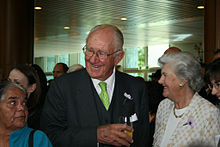 Malcolm Fraser at Parliament House in 2008, for Kevin Rudd's national apology to the Stolen Generations.
Malcolm Fraser at Parliament House in 2008, for Kevin Rudd's national apology to the Stolen Generations.
After 1996, Fraser was critical of the Howard Coalition government over foreign policy issues (particularly Howard's alignment with the foreign policy of the Bush administration, which Fraser saw as damaging Australian relationships in Asia). He opposed Howard's policy on asylum-seekers, campaigned in support of an Australian Republic and attacked what he perceived as a lack of integrity in Australian politics, together with former Labor prime minister Gough Whitlam, finding much common ground with his predecessor.[16][17]
The 2001 election completed Fraser's estrangement from the Liberal Party. Many Liberals criticised the Fraser years as "a decade of lost opportunity," on deregulation of the Australian economy and other issues. In early 2004, a Young Liberal convention in Hobart called for Fraser's life membership of the Liberal Party to be ended.
In 2006, Fraser launched a "scathing attack" on the Howard Liberal government, attacking their policies on areas such as refugees, terrorism and civil liberties, and that "if Australia continues to follow United States policies, it runs the risk of being embroiled in the conflict in Iraq for decades, and a fear of Islam in the Australian community will take years to eradicate". Fraser also said the way the Howard government handled the David Hicks, Cornelia Rau and Vivian Solon cases was questionable.[18][19] On 20 July 2007, Fraser sent an open letter to members of the large activist group GetUp!, encouraging members to support GetUp's campaign for a change in policy on Iraq including a clearly defined exit strategy.[20] Fraser stated: "One of the things we should say to the Americans, quite simply, is that if the United States is not prepared to involve itself in high-level diplomacy concerning Iraq and other Middle East questions, our forces will be withdrawn before Christmas."[citation needed]
After the defeat of the Howard government at the 2007 federal election, Fraser claimed Howard approached him in a corridor, following a cabinet meeting in May 1977 regarding Vietnamese refugees, and said: "We don't want too many of these people. We're doing this just for show, aren't we?" The claims were made by Fraser in an interview to mark the release of the 1977 cabinet papers. Howard, through a spokesman, denied making the comment.[21]
In January 2008, Liberal MP Sophie Mirabella[22] launched an attack on Fraser, after a speech he gave at Melbourne University on "the Bush Administration (reversing) 60 years of progress in establishing a law-based international system"[citation needed], claiming errors and "either intellectual sloppiness or deliberate dishonesty"[citation needed], and that he tacitly supports Islamic fundamentalism, should have no influence on foreign policy, and that his stance on the war on terror has left him open to caricature as a "frothing-at-the-mouth leftie".[23]
In December 2009, shortly after the election of Tony Abbott to the Liberal Party leadership, Fraser resigned from the Liberal Party.[24] Fraser said "the party was no longer a liberal party but a conservative party".[25]
Malcolm Fraser Collection at the University of Melbourne
In 2004, Fraser designated the University of Melbourne the official custodian of his personal papers and library to create the Malcolm Fraser Collection at the University of Melbourne.[26]
Honours
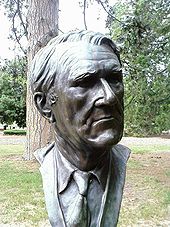 Bust of Malcolm Fraser by political cartoonist, caricaturist and sculptor Peter Nicholson located in the Prime Minister's Avenue in the Ballarat Botanical Gardens
Bust of Malcolm Fraser by political cartoonist, caricaturist and sculptor Peter Nicholson located in the Prime Minister's Avenue in the Ballarat Botanical Gardens
Fraser was made a Privy Councillor in 1976, a Companion of Honour in 1977[27] and a Companion of the Order of Australia in 1988.[28] In 2000 he was awarded the Human Rights Medal. He received the Grand Cordon of the Order of the Rising Sun from the Emperor of Japan in 2006. In 2009, he received the highest honour of Papua New Guinea, the Grand Companion of the Order of Logohu.[29]
He has been awarded honorary doctorates from Deakin University, Murdoch University and the University of South Carolina, and is a Professorial Fellow at the Asia Pacific Centre for Military Law at the University of Melbourne. He is a Vice-President of the Royal Commonwealth Society.
See also
References
- ^ "Prime Facts 22" (PDF). Old Parliament House. The Australian Prime Ministers Centre. http://www.apmc.oph.gov.au/lib/docs/22%20Fraser%20Web.pdf. Retrieved 20 August 2008.
- ^ a b "Malcolm Fraser". National Museum of Australia. http://www.nma.gov.au/education/school_resources/websites_and_interactives/primeministers/malcolm_fraser/. Retrieved 17 June 2010.
- ^ Australian Biography– Malcolm Fraser, part 10, 14-April-1994
- ^ "John Malcolm Fraser, PC, AC, CH". The Australian Prime Ministers Centre. Archived from the original on 18 July 2008. http://web.archive.org/web/20080718234133/http://www.apmc.oph.gov.au/lib/docs/22+Fraser+Web.pdf. Retrieved 22 December 2008.
- ^ http://www.australianbiography.gov.au/subjects/fraser/interview10.html
- ^ In Matters for Judgment, Sir John Kerr recounted having to reject (on the ground that it was unsigned) government advice to that end proffered by Attorney-General Kep Enderby.
- ^ The Murdoch papers and the 1975 ‘dismissal’ election: oxfordbigideas.com[dead link]
- ^ "ABC-TV– ''The 7:30 Report'', 1 January 2006". Abc.net.au. http://www.abc.net.au/7.30/content/2006/s1820146.htm. Retrieved 25 April 2010.
- ^ "When talk of racism is just not cricket". The Sydney Morning Herald. 16 December 2005. http://www.smh.com.au/news/opinion/when-talk-of-racism-is-just-not-cricket/2005/12/15/1134500961607.html. Retrieved 19 August 2007.
- ^ "Australia let apartheid-era team pass through to NZ". New Zealand Herald. 2 January 2008. http://www.nzherald.co.nz/section/1/story.cfm?c_id=1&objectid=10484995.
- ^ "You got him in, so help kick him out". The Australian. 16 April 2008. http://www.theaustralian.news.com.au/story/0,25197,23545662-7583,00.html.
- ^ Steketee, Mike (1 January 2008). "Howard in war refugee snub: Fraser". The Australian. http://www.theaustralian.news.com.au/story/0,25197,22993100-601,00.html. Retrieved 6 January 2008.
- ^ A brief history of SBS, SBS web site
- ^ "Finding Security in Terrorism’s Shadow: The importance of the rule of law". The Malcolm Fraser Collection. The University of Melbourne. 25 October 2007. http://www.unimelb.edu.au/malcolmfraser/speeches/nonparliamentary/findingsecurity.html. Retrieved 17 December 2007.
- ^ "Mal's trousers and me: Tamie". The Australian. http://www.theaustralian.news.com.au/story/0,25197,22304170-601,00.html. Retrieved 25 August 2007.[dead link]
- ^ "7.30 Report – 10/11/2005: Fraser speaks out on Whitlam dismissal". Abc.net.au. http://www.abc.net.au/7.30/content/2005/s1503097.htm. Retrieved 25 April 2010.
- ^ Mayoh, Lisa (12 November 2007). "Malcolm Fraser, Gough Whitlam attack political integrity | Herald Sun". News.com.au. http://www.news.com.au/heraldsun/story/0,21985,22741420-662,00.html. Retrieved 25 April 2010.
- ^ "Fraser urges Iraq policy rethink". ABC News. http://www.abc.net.au/news/newsitems/200611/s1798610.htm. Retrieved 30 December 2006.
- ^ "Howard rejects Fraser's concerns". Abc.net.au. 20 October 2005. http://www.abc.net.au/news/newsitems/200510/s1486787.htm. Retrieved 25 April 2010.
- ^ "A Message From Malcolm Fraser, Former PM". GetUp!. http://www.getup.org.au/campaign/OurOwnPlanForIraq&id=20. Retrieved 20 July 2007.
- ^ Mike Steketee, National affairs editor (1 January 2008). "Howard in war refugee snub: Fraser– The Australian 1/1/2008". Australianit.news.com.au. http://www.australianit.news.com.au/story/0,24897,22993100-601,00.html. Retrieved 25 April 2010.
- ^ "Ms Mirabella boycotted the historic national apology to the 'Stolen Generations'". Melbourne: Theage.com.au. 14 February 2008. http://www.theage.com.au/news/national/outspoken-liberal-mp-defends-apology-boycott/2008/02/14/1202760494786.html. Retrieved 25 April 2010.
- ^ "Liberal MP attacks 'frothing' Fraser– National–". Melbourne: Theage.com.au. 6 January 2008. http://www.theage.com.au/news/national/liberal-mp-attacks-frothing-fraser/2008/01/05/1198950131148.html. Retrieved 25 April 2010.
- ^ Austin, Paul (26 May 2010). "Malcolm Fraser Quits Liberal Party: The Age 26/5/2010". Melbourne: Theage.com.au. http://www.theage.com.au/national/former-pm-malcolm-fraser-quits-liberal-party-20100526-wbes.html. Retrieved 5 June 2010.
- ^ Gillham, Alexis (26 May 2010). "Former PM Malcolm Fraser quits Liberals: Herald Sun 26/5/2010". Heraldsun.com.au. http://www.heraldsun.com.au/news/former-pm-malcolm-fraser-quits-liberals/story-e6frf7jo-1225871380387. Retrieved 5 June 2010.
- ^ "The Malcolm Fraser Collection". University of Melbourne. http://www.unimelb.edu.au/malcolmfraser/. Retrieved 17 December 2007.
- ^ It's an Honour – Companion of Honour
- ^ It's an Honour – Companion of the Order of Australia
- ^ "Former Aust PM awarded top honour", The National, 31 December 2009
Further reading
- Ayres, Philip (1987), Malcolm Fraser, a Biography, Heinemann, Richmond, Victoria. ISBN 0 85561 060 3
- Kelly, Paul (2000), Malcolm Fraser, in Michelle Grattan (ed.), Australian Prime Ministers, New Holland, Sydney, New South Wales. ISBN 1 86436 756 3
- Kerr, John (1978), Matters for Judgment. An Autobiography, Macmillan, South Melbourne, Victoria. ISBN 0 333 25212 8
- Lopez, Mark (2000),The Origins of Multiculturalism in Australian Politics 1945–1975, Melbourne University Press, Carlton South, Victoria. ISBN 0 52284895 8
- O'Brien, Patrick (1985), Factions, Feuds and Fancies. The Liberals, Viking, Ringwood, Victoria. ISBN 0 670 80893 8
- Reid, Alan (1971), The Gorton Experiment, Shakespeare Head Press, Sydney, New South Wales
- Reid, Alan (1976), The Whitlam Venture, Hill of Content, Melbourne, Victoria. ISBN 0 85572 079 4
- Schneider, Russell (1980), War Without Blood. Malcolm Fraser in Power, Angus and Robertson, Sydney, New South Wales. ISBN 0 207 14196 7
- Simons, Margaret with Fraser, Malcolm (2010), Malcolm Fraser: The Political Memoirs, Melbourne University Publishing Limited (Miegunyah Press), Melbourne, Victoria. ISBN 9780522855791
- Snedden, Billy Mackie and Schedvin, M. Bernie (1990), Billy Snedden. An Unlikely Liberal, Macmillan, South Melbourne, esp. Ch. XV and XVI. ISBN 0 333 50130 6
External links
- Malcolm Fraser– Australia's Prime Ministers / National Archives of Australia
- Australian Biography– Malcolm Fraser An extensive 1994 interview with Fraser
- Fraser demands global ban on execution
- The Malcolm Fraser Collection at the University of Melbourne Archives
- Malcolm Fraser at the National Film and Sound Archive
- Video of Malcolm Fraser and Gough Whitlam in their pro-republic commercial
- How to revive a party that seems to be stuck in opposition: Malcolm Fraser– The Age 11/02/2008
- Balanced policy the only way to peace: Malcolm Fraser– The Age 10/05/2008
Parliament of Australia Preceded by
Donald McLeodMember for Wannon
1955–1983Succeeded by
David HawkerPolitical offices Preceded by
Jim ForbesMinister for the Army
1966–1968Succeeded by
Phillip LynchPreceded by
John GortonMinister for Education and Science
1968–1969Succeeded by
Nigel BowenPreceded by
Allen FairhallMinister for Defence
1969–1971Succeeded by
John GortonPreceded by
David FairbairnMinister for Education and Science
1972Succeeded by
Gough WhitlamPreceded by
Billy SneddenLeader of the Opposition of Australia
1975Preceded by
Gough WhitlamPrime Minister of Australia
1975–1983Succeeded by
Bob HawkeParty political offices Preceded by
Billy SneddenLeader of the Liberal Party of Australia
1975–1983Succeeded by
Andrew PeacockPrime Ministers of Australia Federal Parliamentary Leaders of the Liberal Party of Australia Categories:- Prime Ministers of Australia
- Australian republicans
- Australian Leaders of the Opposition
- Members of the Australian House of Representatives for Wannon
- Members of the Australian House of Representatives
- Members of the Cabinet of Australia
- Liberal Party of Australia politicians
- Members of the Privy Council of the United Kingdom
- People educated at Geelong Grammar School
- Alumni of Magdalen College, Oxford
- Politicians from Melbourne
- Companions of the Order of Australia
- Members of the Order of the Companions of Honour
- Recipients of the Order of the Rising Sun
- Clan Fraser
- Australian Presbyterians
- 1930 births
- People educated at Melbourne Grammar School
- Living people
- People from Deniliquin
- American Enterprise Institute
- Australian people of Canadian descent
- Australian people of Scottish descent
Wikimedia Foundation. 2010.

